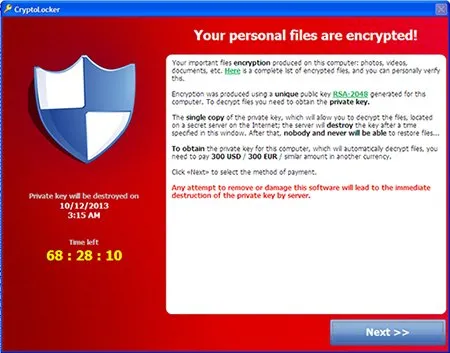Most ransomware viruses are malicious and aggressive, without hinting at an ounce of remorse.
However, the most recent one to hit the interwebs totally bucks that trend.
"I'm Sorry" is the name of the latest ransomware virus to make the rounds and it is by far the most apologetic of any of the previous viruses I have seen to date.
By the way, if you are unfamiliar, a ransomware virus is defined as:
"A type of malware that prevents or limits users from accessing their system, either by locking the system's screen or by locking the users' files unless a ransom is paid."
In the modern world of cryptocurrencies it meas this:
"Crypto-ransomware encrypts certain files on infected systems and then forces users to pay the ransom via certain online payment methods, like bitcoin, in order to get a decryption key."
What makes this one different?
As "I'm Sorry" infects your computer and takes control of many of your files it displays a message that is intended to make the attacked feel truly sorry for the developers of the virus. It even apologizes for taking control of the victim's files.
Sounds like they are just a bunch of nice guys, eh?
It is likely written in this manner with the hopes that the person who is infected would feel sorry for the developers of the virus and be more willing to pay the ransom request.
A ransom request that isn't all that cheap I might add...
They are asking for $500 in Bitcoin payments. That is roughly double or even triple what most of the ransomware viruses ask for from their victims.
It appears our apologetic ransomers are hoping to pocket some big coin from this!
The ransom even goes as far as explaining how to purchase bitcoins using Coinbase or LocalBitcoins. Also, it explains how to create a bitcoin wallet at Blockchain.info.
That is also a little bit unusual compared to other cyber attacks, but it doesn't stop there.
Adding to the unusual nature of this attack, the next part of their message even goes on to list a few links to posts explaining what bitcoin is and how it works.
It appears they want to educate the people they are stealing from, how sweet.
However, it's really not all that different in the end.
Things are not all rainbows and puppy dogs, however, as the end of the message is concluded with this phrase:
"If you fuck around, I will delete your key."
Nice guys, eh?
The assumption is that they mean their decryption key. Like it was going to be returned in the first place...
In the majority of ransomware cases the data is never returned to the victims, even when the ransom is paid. The best thing that can be done is contact your local authorities and let them advise you on the best steps to take next.
If you didn't already know, and it wasn't made abundantly clear in my post, the answer to the question in the title should be a resounding, "No!"
Ransomware is here to stay, much the same way cryptocurrencies are here to stay.
As I posted yesterday steps are being taken to better prevent these kinds of attacks in the future by major government agencies.
The post can be read here:
https://steemit.com/cryptocurrency/@jrcornel/the-eu-is-pledging-to-fight-back-against-ransomware-attacks
However, for that to be the case it will likely mean that paper trails of sorts will likely be implemented in order to see where these virtual transactions go. That means a lot of the anonymity that virtual currencies currently enjoy will likely go away.
It will be interesting to see what that means for the cryptocurrency markets once that becomes more of a reality.
However, one thing to keep in mind is that regulating and monitoring these things as currently constructed will likely be a lot more difficult than many people believe.
Not to mention it will take a lot of time before it is really possible.
In the post I linked above, it talks about a committee being created that will be responsible for coming up with solutions to monitor and track virtual currencies. They are being given 3 years to do so...
Not 3 years to actually regulate them, but 3 years to come up with a plan of how to do it.
Yea, we are a ways away from these things being regulated in any meaningful way.
Stay informed my friends!
Sources:
https://www.trendmicro.com/vinfo/us/security/definition/ransomware
https://themerkle.com/bitcoin-ransomware-education-im-sorry/
Image Sources:
http://www.idigitaltimes.com/new-ransomware-installers-can-infect-computers-without-users-clicking-anything-say-522756
https://themerkle.com/bitcoin-ransomware-education-im-sorry/
https://www.trendmicro.com/vinfo/us/security/definition/ransomware
Follow me: @jrcornel


